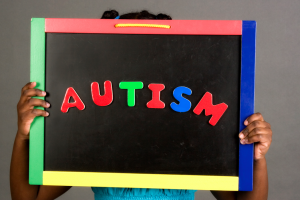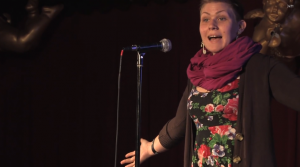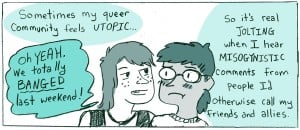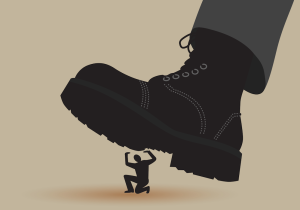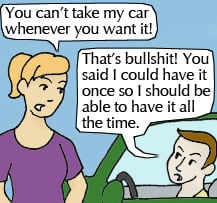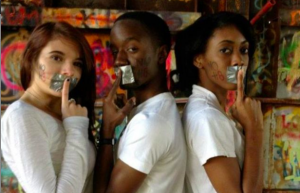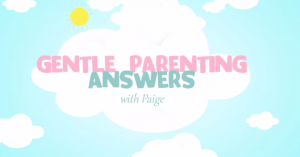I used to want to cure autistic people.
I babysat for an autism support group and listened pityingly as parents described how hard it was to have a child on the spectrum – thinking nothing of the fact that those children were right there listening.
I begged my mom to take my autistic sister, Caley, and me to an autism cure event, ignoring the fact that my sister herself wasn’t interested in doing so.
Later, I went still further and led a fundraiser at my high school to raise hundreds of dollars for Autism Speaks, an organization that pushes for a cure for autism.
As the sibling of an autistic person, I felt it was my duty to do these things to show my support for her and others like her.
Here’s the thing, though: Many autistic people don’t actually want a cure.
More heartbreakingly, I didn’t realize that my own sister felt that way, too – that as I was proudly marching to help her, she was right there silently wishing that I wasn’t.
It was incredibly insensitive, and even ableist, of me to advocate for her without first checking with her to see if she wanted my advocacy.
And what I would later learn is that the most critical part of being an ally is prioritizing the voices of the marginalized, like Caley’s, instead of overwriting their words and beliefs with our own assumptions.
If you’re advocating for an autism cure, you’re making the same mistake that I once was.
I know it’s because you care about the autistic person in your life and want to make their life as easy as possible. But the best way to support autistic people is to listen to them, not assimilate them.
This goes against almost everything we’ve been socialized to believe, so I want to really unpack and address the following five objections that many people who support a cure for autism assert.
I can only hope that if you do harbor these beliefs, you’ll be open to considering this information and changing your position, as I once did.
1. Autistic People Are Suffering and Need a Cure
It is true that a lot of autistic people suffer.
But what they suffer from is not so much being autistic as living in a society that is not friendly to autistic people.
A society that frowns upon people wearing sunglasses and earplugs indoors despite their sensory differences.
A society where someone flapping their hands will be stared at and pitied, or told “quiet hands!” rather than be seen for the joy they’re exhibiting.
A society where, in order to get a job, you first have to get your social skills tested in an interview.
A society in which forms of communication other than spoken ones are often ignored and thought of as lesser.
A society where different means incompetent and neurodiversity is a foreign concept.
The people who enforce these beliefs are not only telling autistic people that their very existence is wrong, but they are participating in oppression.
Moreover, the idea of curing autism isn’t as simple as it seems from the outside. Autism is a developmental disorder, meaning people on the spectrum are autistic their whole lives.
They know no other way of being – it’s part of who they are.
Autism isn’t something that you can get rid of it without changing who a person is at their core. Autism is a neurological difference that inherently shapes an autistic person’s identity, perspectives, dreams, and desires.
As my sister put it: “Whenever you tell an autistic person they should be cured, you’re telling them that they shouldn’t be them.”
Unsurprisingly, hearing that is hurtful, and constantly getting these messages from society is enough to pulverize many autistic people’s concepts of self-worth.
2. But What About the Autistic People Who Can’t Communicate and Are Trapped in Their Own Worlds?
Okay, there are a couple of big assumptions I need to address here.
As a general rule, everyone communicates, even non-speaking autistic people. Because behavior is communication.
When an autistic child I was caring for threw himself to the ground after I tried to take him into the waiting room, he didn’t use words. But he definitely communicated that he did not want to go in that room.
Everyone communicates – they just don’t always speak to do so. But even people who speak in atypical ways, like by applying lines from a television show to communicate what they want in real life, often have their communication overlooked.
Our society expects everyone to communicate in the same way that we do, and those who don’t are ignored.
Perhaps the problem isn’t with autistic people’s communication, but with those who refuse to acknowledge what they’re saying.
The other assumption is that autistic people are trapped in their own worlds.
Yes, many autistic people report having imaginary worlds, but that isn’t a bad thing. It’s an escape from a society that is often not friendly to them and a world that can be – even to the people in the neurotypical majority – scary or just plain boring some times.
And seeing the beauty in parts of the world that most of us don’t even notice, like the shimmering dust motes that dance through the air or the mesmerizing spin of fan blades overhead, isn’t a bad thing either.
Those of us who are neurotypical could learn something from that.
What’s more, autistic people do not magically inhabit a different world. They’re right here on Earth, with you and me, and to act like they’re not is not only incorrect, it’s hurtful.
And to address the core argument, there’s this assumption that because they’re different from us in ways most neurotypical people could not imagine being, so called “low functioning” non-speaking autistic people must want a cure.
But—well—that’s not the case.
People all over the spectrum can live happy, worthy lives.
There are some really great non-speaking autistic bloggers who write about their lives, which are just as human and filled with ups and downs as anyone else’s. And even people who can’t type can communicate their utter joy through flapping hands and jumping feet.
In short, autistic people all over the spectrum can be happy people.
And, if we as a society are doing our job right, they are just as capable for loving themselves for who they are as anyone else.
3. But Shouldn’t We Be Pushing for a Cure on Behalf of Those Who Do Want One?
People keep misunderstanding this critical point, but there is no cure for autism.
It doesn’t exist!
No matter how much money is poured into it, it doesn’t seem like it’s going to exist any time soon – at least not in the form that people imagine.
Looking at research, it’s apparent that we’re more likely to see a preventative measure than a magic “cure” pill.
The leading candidate is a genetic screening in-utero, in which case, as with Down Syndrome, we could see an option for an autism “cure” through abortion of fetuses suspected to have autism.
And fundraising for this – the only current viable option – rather than fundraising to help families, sounds a lot like eugenics to me – every person on the spectrum’s worst nightmare.
The second side of this problem is that there are reasons many autistic people want cures, and those reasons are societal in nature.
Throughout most autistic people’s lives they have been told that they are lesser.
They’ve been taken to fundraisers to raise money to “fix” them, their parents talk about what a burden they are right in front of them, and when they dare to be themselves in public, they’re greeted with disapproving stares.
If you lived this life, wouldn’t you want to be cured of that thing that you’ve been told all your life that you need to be cured of?
For some autistic people, the answer is yes. But the realistic solution, which already exists, is not an imaginary cure, but helping them love and accept themselves for who they are.
It’s helping them see the strengths being autistic provides, rather than only hammering the weaknesses down their throats.
In short, acceptance is the cure.
4. But Donating Money Towards Research for a Cure Isn’t Harmful, Right?
Unfortunately, it is harmful.
The mere fact that others find autistic people’s lives so faulty that they raise money for a cure is hurtful to a lot of people on the spectrum.
More than that, money donated towards prevention/cures is money that doesn’t go to help the autistic people already here.
Autism Speaks is a great example of this dilemma. So much of their budget goes to cure/cause related research (followed closely by fundraising and advertising, which is 43% of their budget) that only 4% of their money goes towards services for families of autistic people, and only 0.25% of their research budget goes towards research to benefit autistic adults.
Given that cure research isn’t even wanted by many autistic people and much-needed services for adults on the spectrum go underfunded, is this harmful dynamic really something you want to contribute to?
5. What About Pushing to Find the Cause of Autism? That’s Not Harmful
Wrong – for multiple reasons.
For one thing, you’ve got the same problem as in #4 – money that goes towards finding the cause of autism is money that doesn’t go resources to help the autistic people already here.
Moreover, generally the reason people pour time/money/energy into looking for a cause is to find a cure and prevent autism.
That sends the exact same message to the people it’s intended to help – that they are lesser and their existence must be prevented at all costs.
So What’s an Autism Ally to Do?
1. Don’t Donate Money Towards Cure, Cause, and Prevention Organizations
Don’t despair – there are loads of organizations you can donate to that actually do focus on services and education to benefit autistic adults and children alike.
The Autistic Self Advocacy Network is a great example of one such organization. Best of all, unlike most autism organizations, this one is led by autistic people themselves and does a far better job of representing their interests as a result.
Another great organization is The Arc/The Autism NOW Center, which prioritizes autistic individuals’ needs, rather than what our society thinks they need.
So the next time you feel the inclination to walk and raise money to help autistic people, you can walk with pride if you’re supporting one of those groups.
2. Work to Make Society More Autism-Friendly
If you’re part of a business, some autism organizations offer the ability to train your business in working with people on the spectrum.
Initiatives like this do a great job of breaking down the societal barriers autistic people face.
Check into your state or country’s autism organizations or local autism support group to see what’s available in your area for this.
Changing our society doesn’t have to require big steps.
Simply greeting someone flapping their hands with a smile rather than a stare and understanding instead of chiding when they don’t make eye contact are enough to make an impact in of themselves.
3. Educate Yourself Around Autism
Autistikids is a great website I helped edit that connects readers to the words of autistic adults explaining autism. If you prefer video, the Ask an Autistic series on YouTube is highly informative.
If you’re a parent or relative of a child on the autism spectrum, you’re in a unique position to shape how your child thinks about being autistic.
You can help make it so that, rather than being ashamed of being ‘defective’ and wishing for a cure that doesn’t exist, your child loves themselves for who they are.
There are lots of great resources to help you do this – I love the book Different Like Me: My Book of Autism Heroes because it helps children feel proud of their neurology.
There are also websites like Autism Spectrum Explained for Kids (which I created) for helping children on the spectrum and siblings understand autism in a self-esteem enhancing way.
Letters to Autistic Kids is another great initiative where autistic kids can read letters of support from other autistic people.
Finally, connecting your autistic child to an autistic peer or mentor, such as through pen-paling, is a wonderful way to help them appreciate their neurology.
***
These are just a small sampling of ways you can be an ally and make the world a better place for autistic people.
If we do our job right with all of these things, not a single autistic person will ever have to want a cure for who they are again.
[do_widget id=’text-101′]
Creigh Farinas is a Contributing Writer for Everyday Feminism. She’s a graduate student pursuing a Master’s degree in Speech Language Pathology and who already has a B.A. in Psychology and a post-baccalaureate in Communication Sciences and Disorders. Absolutely none of those things, however, gave her understanding of autism as a whole, let alone disability rights. Instead, all her knowledge was gained learning from people on the autism spectrum and with other disabilities themselves, particularly her sister, Caley, who is Autistic and has dysgraphia and anxiety disorders. Creigh is still learning more every day, and her sister Caley reads, edits, and approves everything that Creigh writes about disabilities. You can see more of Creigh and Caley’s writing at Autism Spectrum Explained.
Caley Farinas is a Contributing Writer for Everyday Feminism. She’s a recent graduate with a Bachelor’s in Public Health who writes about the effect society has on the “disabled”. She enjoys reading and being with her sister. Caley writes from her experience as an Autistic woman with dysgraphia and anxiety disorders. Because of these disabilities, it is hard for her to write and she gets assistance from her sister Creigh in writing/typing. That said, any words that you see attributed to her are her own, and she edits and approves anything her sister Creigh types. You can see more of Caley and Creigh’s writing on their website Autism Spectrum Explained and their Facebook page.
Search our 3000+ articles!
Read our articles about:
Our online racial justice training
Used by hundreds of universities, non-profits, and businesses.
Click to learn more


